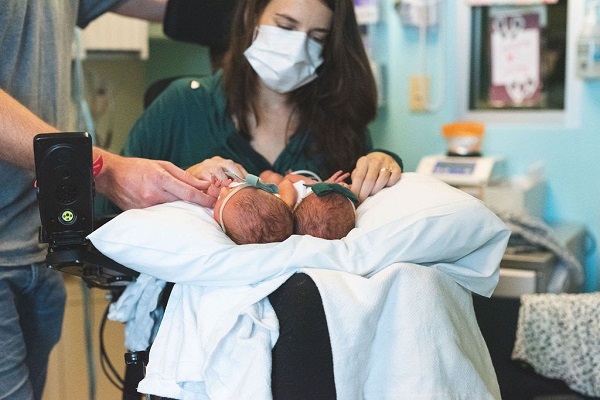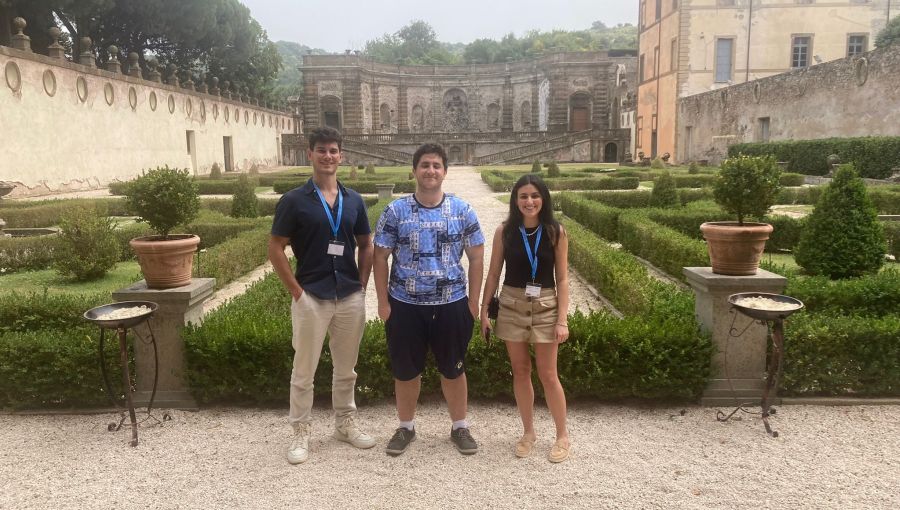Disability as Opportunity: Meet JCU Alumna Dani Izzie
Alumna Dani Izzie earned her B.A. in English Literature at JCU in 2007. Dani grew up in the Washington D.C. area and spent her summers with her mother’s family in Genoa, Italy. In 2014 she completed her M.A. in English Literature at California Polytechnic State University-San Luis Obispo. She currently works as Social Media Manager at Spinergy, Inc. and lives with her husband and twin daughters in rural Virginia.
Dani’s blog Dani Izzie – Disability Lifestyle & Culture shares insights from her personal journey as a wheelchair user and seeks to dispel preconceived notions about disabled people. The documentary Dani’s Twins, currently being filmed, will tell her story as one of the very few quadriplegics to give birth to twins.
Dani was recently interviewed by JCU’s Director of Web Communications, Berenice Cocciolillo.
What made you decide to earn your degree abroad at John Cabot University?
My AP European History teacher in high school clued me into applying to JCU in Rome. He knew my mom was from Italy and that I was drawn to Italian and European culture. I am pleased to have studied English Literature at JCU. Classes were very small and I had a great deal of individual attention from my professors. I got to engage in one of my favorite pastimes, reading, while also honing my analytical and communication skills.
After your return to the US, a fall left you with a serious spinal cord injury. Yet, in your blog post “How I re-claimed disability,” you write, “After 10 years of living with paralysis, I feel privileged.” Please explain.
This may be a difficult concept for most to understand, but you get tired of being seen as the victim of a tragedy, so I chose to flip the switch. Rather than focusing on the medical aspect of disability, I approach it from a social vantage point. In that respect, I am privileged to be part of the disability community full of pioneers and advocates. I’m privileged to have the wisdom from having lived in two different bodies. It’s kind of like being bilingual – I intimately understand the non-disabled worldview as well as the disabled one. Adapting to a life-changing physical injury personally brought about an ambition to succeed. Challenging situations can be transformative if you let them be.

Dani Izzie and her twin daughters Lavinia and Giorgiana
You also write, “Toxic thinking about illness or disability is unfortunately a knee-jerk social phenomenon.” How does this toxic thinking manifest itself and how can we overcome it?
People fear disability because they don’t want it to happen to them. Of course, this is understandable and natural, but it manifests itself in ugly ways including the exclusion and even revulsion of people with disabilities around the world, which results in systemic socio-economic oppression. By engaging with and including people with disabilities into our social fabric- and not just as compartmentalized “good deeds,” but through true inclusion—friendships with, marriages to, and employment of disabled individuals, we bridge the gap of difference. These shouldn’t be radical acts, they should just be the norm.
Congratulations on recently becoming the mother of twins Lavinia and Giorgiana! You do a lot of myth-busting in your blog and say that being disabled and pregnant with twins is one of the most empowering situations a woman can be in. How do you respond to those who express amazement at the fact that a quadriplegic woman could carry out a pregnancy?
Thanks! Many people see wheelchairs and make all kinds of bizarre assumptions. A wheelchair and even quadriplegia are really not indicators of poor health or poor quality of life, especially in modern economies. I also think there is a misconception that paralysis means that your entire body just quits on you, but the truth is that most of the other systems still work including the female reproductive system. I even had contractions—contractions are reflexes that are intact despite paralysis.
What kind of challenges did the current Covid-19 pandemic present for you?
I have impaired lung function since my diaphragm and abdominal wall are paralyzed. This puts me at greater risk of facing life-threatening complications if I were to have the coronavirus. On top of that, I gave birth to premature infants. So with all the exposure in the hospital and doctors’ visits, things were a little nerve-wracking, but we all stayed safe. Currently, the pandemic is forcing us to do without childcare and personal assistance at home, which is tough as a quadriplegic and a twin mom, but I’m coping!
Tell us about your job at Spinergy, Inc.
Spinergy is a successful family-owned business that started off manufacturing elite bicycle wheels in the 1990s. My boss was approached by a wheelchair tennis athlete who asked him to design a performance wheelchair wheel as there were none on the market at that time, and the business flourished. I work in marketing for both the bicycle and wheelchair division of the company, which is based in California where I previously lived. Now I live in Virginia and work remotely. The job has afforded me access to an incredible community of disabled athletes.
You are the subject of Dani’s Twins, a documentary film about your experience as one of the very few quadriplegics to give birth to twins. How did this project come about? Why is it important for you to tell your story?
I was approached by my friend Brad Allgood who is an award-winning filmmaker with a background in international development and public health. His last documentary Landfill Harmonic received many accolades for its portrayal of a Paraguayan orchestra that plays instruments made entirely out of garbage salvaged from landfills. I trusted him to tell our story in a manner that was respectful and mindful of the way I want my disability to be represented on screen, specifically, avoiding “inspiration porn,” which is the portrayal of people with disabilities as inspirational solely on the basis of their disability – which can often feel humiliating and demoralizing. It is important to tell this story to show how natural and normal it is for disabled people to be parents and caregivers themselves. We hope the film positively impacts prospective parents and curbs discriminatory attitudes.





